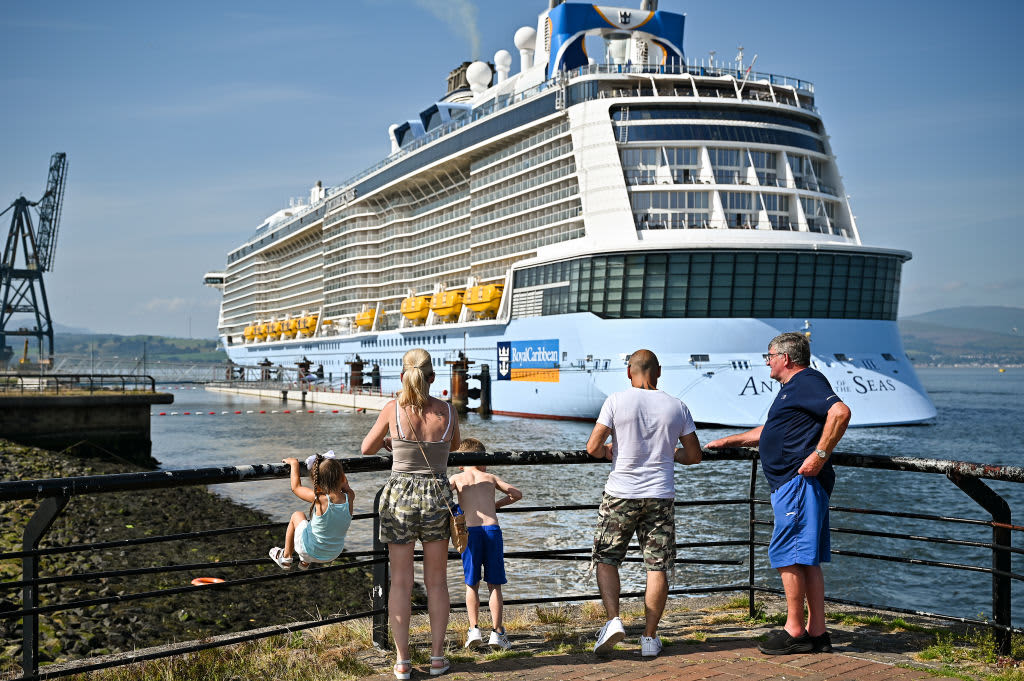Royal Caribbean posts wider-than-expected loss as Covid delta variant hurts its ability to fill ships this summer

Royal Caribbean Cruises reported disappointing second-quarter results Wednesday as the spread of the Covid delta variant dampened demand for short-term bookings and costs rose as the cruise line prepared ships to return to operation.
Shares closed Wednesday down 2.5% at $72.66 on the news. Royal Caribbean’s stock peaked above $99 in February, buoyed by the hope the industry would bounce back, as increasing numbers of people were being vaccinated. However, as vaccination rates slowed and the delta variant spread in the U.S., the stock has pulled back. With Wednesday’s sell-off, shares are down 2.4% since the start of the year. Royal Caribbean has a market value of $18.43 billion.
Here’s how the company did for its second quarter ended June 30 compared with what analysts surveyed by Refinitiv were anticipating:
- Loss per share: $5.06 adjusted vs. $4.39 expected
- Revenue: $50.9 million vs. $149.7 million expected
During its second quarter, the company’s net loss narrowed to $1.35 billion, or $5.29 per share, from a loss of $1.64 billion, or $7.83 per share, a year earlier.
Excluding items, Royal Caribbean said it lost $5.06 per share, which was wider than the loss of $4.39 per share expected by analysts surveyed by Refinitiv.
Royal Caribbean reported revenue of $50.9 million, which was far less than the $149.7 million analysts had expected.
The company said booking activity for 2021 sailings is consistent with its expected capacity and occupancy ramp-up, with prices that are higher than 2019, even with the dilutive impact of future cruise credits. Travelers on cruises are also spending more than usual.
Bookings grew 50% from the first quarter, but the pace remains below 2019 levels. However, bookings accelerated as the quarter progressed. By June, the company was receiving 90% more bookings each week, when compared with the last quarter.
“While it’s too early to make any definitive conclusions of the impact of the Delta variant on bookings, the company has seen a modest impact on closer-in bookings,” Royal Caribbean said in a press release. “However, 2022 continues to remain strong; in particular the spring and summer months are performing well.”
Earlier this week, the seven-day average of daily coronavirus cases in the U.S. surpassed the peak seen last summer. The highly contagious delta variant is driving up the number of cases in the U.S., particularly among unvaccinated people. Recently, the Centers for Disease Control and Prevention reversed its guidance regarding mask-wearing for fully vaccinated people in indoor settings.
“The return of cruising has been faster than anyone expected. … Overall, we remain optimistic in our mounting trajectory going forward,” said CEO and Chairman Richard Fain, in a statement.
The cruise operator anticipates that 65% of its fleet will be back in service by the end of the third quarter and 80% by year’s end, said Jason Liberty, executive vice president and CFO, during an earnings conference call.
As the company brought capacity back online in the latest quarter, costs rose. Royal Caribbean’s average monthly cash burn rate in the second quarter was about $330 million. The company attributed the higher rate to the cost of bringing additional ships into operation.
Royal Caribbean expects it will see higher costs as it prepares the remainder of its fleet for sailing. It also will have costs for returning crew members to ships and implementing enhanced health and safety protocols.
It expects that it is about six months from breaking even from a cash flow perspective, Liberty said. It ended the quarter with $5 billion in liquidity.
On Friday, Royal Caribbean announced six passengers on a cruise tested positive for Covid. On Wednesday, the company said its procedures helped avoid large outbreaks.
Vaccination has played a key role, according to Fain. Excluding Singapore, 92% of people onboard ships in July were fully vaccinated.
“The idea is to limit the spread of Covid-19 cases on board. We all know it is impossible to eliminate cases on board a ship totally, just as it’s impossible to eliminate cases on land,” Fain said. “That’s the goal: rare individual cases with no significant spread.”
As of the beginning of August, all passengers over the age of 12 are required to be vaccinated on all U.S. cruises, except those departing from Florida. Florida passed a law that has banned businesses from requiring customers to show proof of vaccination. In July, Norwegian Cruise line filed a lawsuit to end this ban.
As the delta coronavirus variant continues to spread, Royal Caribbean last week began requiring all travelers on U.S. cruises five days or longer to have a negative Covid test before boarding.
The cruise industry is one of the last to return to pre-pandemic operations. Several high-profile outbreaks aboard ships at the beginning of the health crisis fanned fears about how easily the virus can spread on ships. The Centers for Disease Control and Prevention has imposed strict guidelines to try to prevent further outbreaks.




